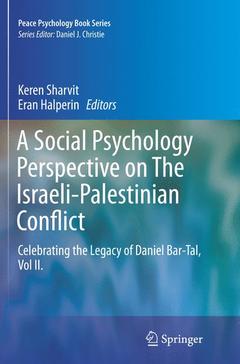A Social Psychology Perspective on The Israeli-Palestinian Conflict, 1st ed. 2016 Celebrating the Legacy of Daniel Bar-Tal, Vol II. Peace Psychology Book Series
Coordonnateurs : Sharvit Keren, Halperin Eran

Opening with an introduction to the Israeli-Palestinian conflict situation and a few chapters on the theoretical backgrounds of the creation of a societal ethos of conflict, the volume then moves to an analysis of the psycho-social underpinnings of the conflict, while concluding with a discussion of the possibility of long-standing peace in the region. Among the topics included in the coverage are:
· Identity formation during conflict· The Israeli and Palestinian ethos of conflict
· The important role of Palestinian and Israeli education
· An analysis of the leadership in the Israeli-Palestinian peace process· The challenges and potential towards a road to peace in the region
All contributors to the volume are pre-eminent scholars of the Israeli-Palestinian conflict, and many of them have felt the influence of Bar-Tal?s formulations in their own work. A rich resource for those who are followers of Dr. Bar-Tal's work, for those who study intractable conflicts in all its forms, and for those who have a particular interest in the Israeli-Palestinian conflict, A Social Psychology Perspective of the Israeli-Palestinian Case offers a detailed exploration of the psychological underpinnings of the Israeli-Palestinian conflict and the barriers to and opportunities of the peace process.
Preface
Keren Sharvit and Eran Halperin
1.
Socio-psychological foundations of the Israeli-Palestinian conflict: Applying Daniel Bar-Tal’s theorizingKeren Sharvit
Part 1: Acquisition of the Socio-Psychological Repertoire
2.
Stereotypes and prejudice in conflict: A developmental perspectiveYona Teichman
3.
Young children’s experiences and learning in intractable conflictsMeytal Nasie
Part 2: Collective Memory and Narratives
4.
The Israeli collective memory of the Israeli-Arab/Palestinian conflict: Its characteristics and relation to the conflictRafi Nets-Zehngut
5. The “silenced” narrative of 1948 War events among young Palestinians i
n IsraelEman Nahhas
6. Perceptions of collective narratives among Arab and Jewish adolescents in Israel: A decade of intractable conflict
Anan Srour, Adi Mana and Shifra Sagy
Part 3: Societal Beliefs and Ethos
7. “Seeing through a glass darkly”: Israeli and Egyptian images of the other
during the Nasserite period (1952-1970)Elie Podeh
8. The Jewish- Israeli ethos of conflict
Neta Oren
9. Ethos of conflict of the Palestinian society
Ronni Shaked
Part 4: Distress, emotions and ideology
10.
Harmed by our protection: Exposure to political violence and political preferences in the range of fireDaphna Canetti
11. Emotions and emotion regulation in intractable conflict and their relation to the ethos of conflict in Israeli society
Ruthie Pliskin and Eran Halperin
Part 5: The role of education
12. When Jewish and Zionist identities encounter otherness: Educational case study
Ohad D
13. Peace education between theory and practice: The Israeli case
Soli Vered
Part 6: Prospects for change?
14. Containing the duality: Leadership in the Israeli-Palestinian peace process
Nimrod Rosler
15. The role of peace organizations during peacemaking processes: the case of the Jewish Israeli society
Tamir Magal
16. The road to peace? The potential of structured encounters between Israeli Jews and Palestinians in promoting peace
Ifat Maoz and Yiftach Ron
17. Addressing Israelis' and Palestinians' basic needs for agency and positive moral identity facilitates mutual prosociality
Ilanit SimanTov-Nachlieli and Nurit Shnabel
Transitional justice in societies emerging from intractable conflicts: Between the right to truth and collective memory
Ofer Shinar Levanon
Explores the the Israeli-Palestinian Conflict from a social-psychology perspective
Presents the potential and limitations in the Israeli-Palestinian peace process
A tribute to the legacy of Daniel Bar-Tal, demonstrating his influence and contribution to the study of the Israeli-Palestinian Conflict
Includes supplementary material: sn.pub/extras
Date de parution : 03-2018
Ouvrage de 287 p.
15.5x23.5 cm
Thèmes d’A Social Psychology Perspective on The... :
Mots-clés :
collective memory in Israel; collective memory in Palestine; culture of conflict; political psychology; psychological barriers to peace-making; the Israel-Palestinian peace process; stereotypes and prejudice in conflict; societal beliefs and ethos; Zionist identities; peace in the Middle East; collective narrative



